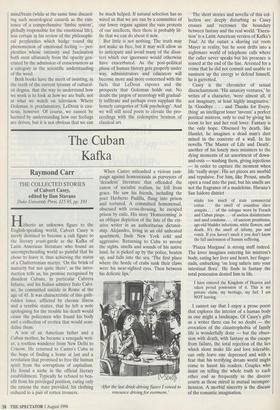The Cuban Kafka
Raymond Carr
THE COLLECTED STORIES of Calvert Casey, edited by Ilan Stavans Duke University Press, 115.95, pp. 193 Hitherto an unknown figure to the English-speaking world, Calvert Casey is surely destined to become a cult figure to the literary avant-garde as the ICafka of Latin American literature who found an uncomprehending world so painful that he chose to leave it, thus achieving the status of a Chattertonian martyr. 'On the brink of maturity but not quite there', as the intro- duction tells us, his promise recognised by dissident Cubans, in particular Cabrera Infante, and his Italian admirer halo Calvi- no, he committed suicide in Rome at the age of 45. It was characteristic of this guilt- ridden loner, afflicted by chronic illness and a terrible stutter, that he left a note apologising for the trouble his death would cause the policemen who found his body and a collection of erotica that would scan- dalise them.
A son of an American father and a Cuban mother, he became a renegade writ- er, a rootless wanderer from New Delhi to Cracow. He returned to Castro's Cuba in the hope of finding a home at last and a revolution that promised to free the human spirit from the corruptions of capitalism. He found a niche in the official literary establishment. Typically he refused to ben- efit from his privileged position, eating only the rations the state provided, his clothing reduced to a pair of rotten trousers. When Castro unleashed a vicious cam- paign against homosexuals as purveyors of 'decadent' literature that offended the canon of socialist realism, he fell from grace. He saw his friends, including the poet Herberto Padilla, flung into prison and tortured. A committed homosexual, obsessed with cross-dressing, he escaped prison by exile. His story 'Homecoming' is an oblique depiction of the fate of the cre- ative writer in an authoritarian dictator- ship. Alejandro, living in an old unheated apartment, finds New York cold and aggressive. Returning to Cuba to savour the sights, smells and sounds of his native land, he is picked up by the police, beaten up, and falls into the sea. 'The first place where the horde of crabs sank their claws were his near-sighted eyes. Then between his delicate lips.'
After the last drink-driving fiasco I vowed to renounce driving for evermore.' The short stories and novella of this col- lection are deeply disturbing as Casey crosses and recrosses the boundary between fantasy and the real world. 'Execu- tion' is a Latin American version of Kafka's Trial. At the outset a shaving cut roots Mayer in reality, but he soon drifts into a nightmare world of telephone calls where the caller never speaks but his presence is sensed at the end of the line. Arrested for a crime that he did not commit and unable to summon up the energy to defend himself, he is garrotted.
Casey is the chronicler of sexual disenchantment. 'His amatory ventures,' he writes of a character, 'were almost all, if not imaginary, at least highly imaginative.' In 'Goodbye . . . and Thanks for Every- thing' an intelligent loner 'invents' a perfect poetical mistress, only to end by giving his room to her and her real lover. Fantasy is the only hope. Obsessed by death, like Hamlet, he imagines a dead man's dust mixed in the concrete of a wall. In his novella 'The Master of Life and Death', another of his lonely men ministers to the dying moments of an assortment of down- and-outs — washing them, giving injections — in order to capture the moment when life 'really stops'. His set pieces are morbid and repulsive. For him, like Proust, smells open a road into the past, but his smells are not the fragrance of a madeleine. Havana's San Isidoro district
stinks too much of stale commercial coitus. . . the smell of countless slave armpits . . . of the cologne worn by French and Cuban pimps. . . of useless disinfectants and used condoms. . . of ancient prostitutes, age-old bladder infections, white flowers, and death. It's the smell of infamy, pus and vomit. If you haven't smelt it you don't know the full uselessness of human suffering.
'Piazza Margana' is strong stuff indeed. The lover imagines entering his mistress's body, eating her liver and heart, her fmger- nails, embarking 'on long safaris into your intestinal flora'. He finds in fantasy the total possession denied him in life.
I have entered the Kingdom of Heaven and taken proud possession of it. This is my private claim, my heritage, my fief. I am NOT leaving.
I cannot say that I enjoy a prose poem that explores the interior of a human body as one might a landscape. Of Casey's gifts as a writer there can be no doubt — the evocation of the claustrophobia of family life is wonderfully done — but the obses- sion with death, with fantasy as the escape from failure, the total rejection of the lies which alone make life and love tolerable, can only leave one depressed and with a fear that his terrifying dream world might come to haunt his readers. Couples who insist on telling the whole truth to each other end as frequently in the divorce courts as those mired in mutual incompre- hension. A morbid sincerity is the disease of the romantic imagination.


























































 Previous page
Previous page